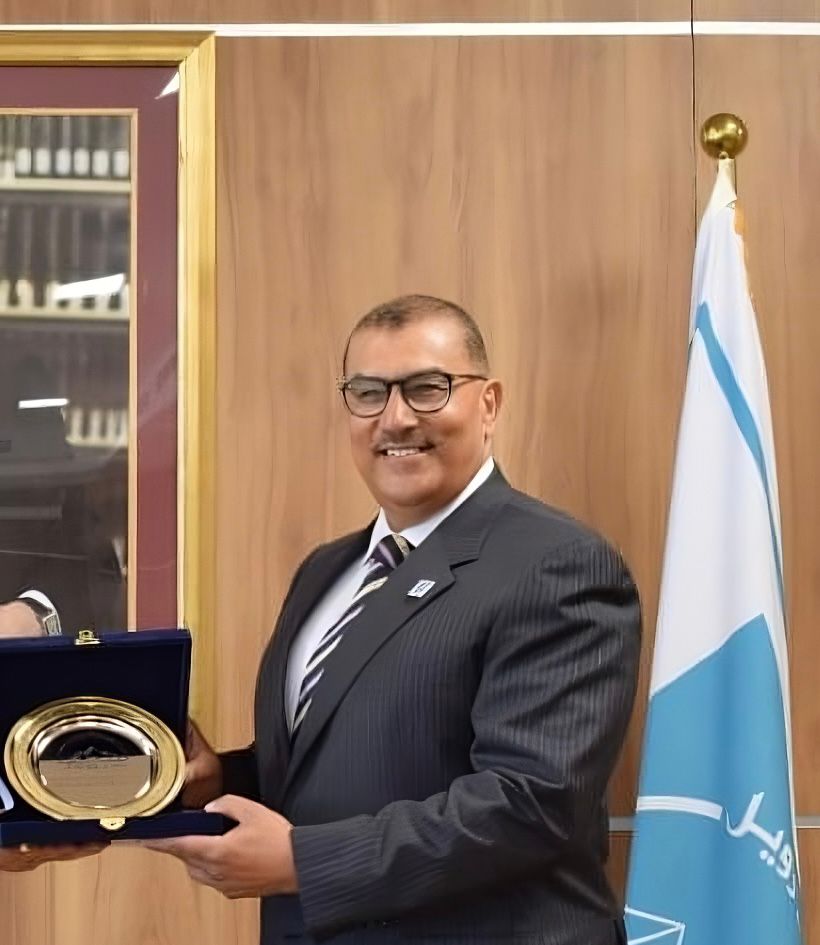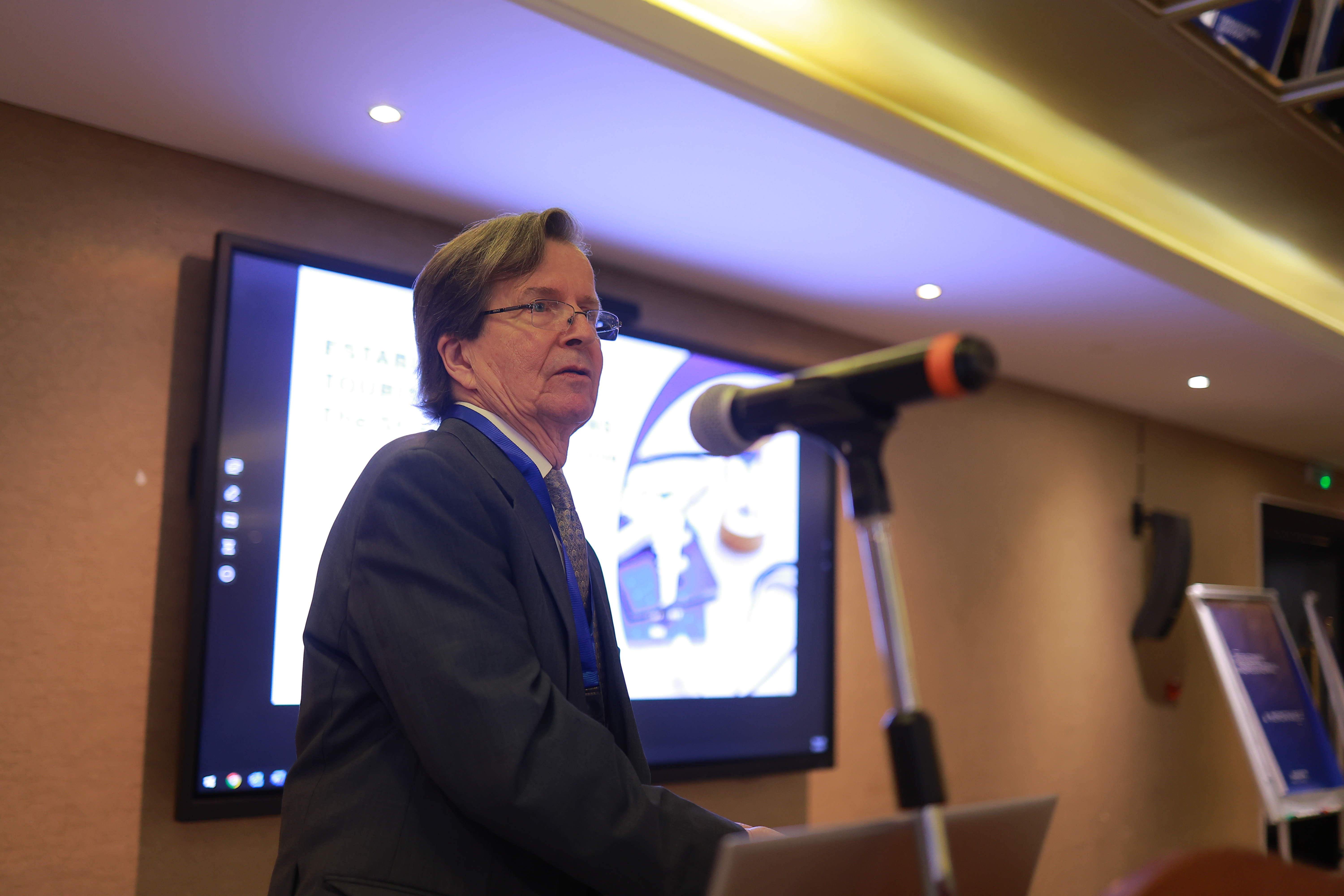Time moves on and circumstances alter, yet Dr. Bahaa remains unchanged - the warm smile is
consistent, the affection for others and dedication to assist them endures, and the commitment
and effort are unwavering... That is Dr. Bahaa Al-Shaarani, as I have known him for over ten
years. His principles and ethics are thorough and creative in his work. Due to his perceptive
vision, SurgiTech’s achievements grow,and its area of operation grows in quantity, quality,
and presence in various locations...its mission is to innovate and create value, its objective is
to serve the patient, and its principle is people first, prioritizing them over profit and
commerce. Dr. Bahaa believes that trade is the objective for individuals, and he is not just a
means to achieve it.
In this engaging and informative interview, our guest addressed various subjects related to
SurgiTech and the medical sector as a whole, emphasizing its ultimate goal of patient service
and care...
Question 1: A few years ago, we interviewed you to thoroughly investigate the motivations
and steps involved in your transition from practicing medicine to becoming involved in the
business side of the healthcare sector. I was truly astonished by that choice. Could you remind
us of the key aspects behind the creation of SurgiTech and what it provides?
Answer: I founded SurgiTech as a means to serve the community and help
patients in ways that extend beyond traditional medical practice. I realized that
by stepping into the business side, I could have a broader impact, facilitating
the introduction of cutting-edge medical products that significantly improve
patient outcomes. My fascination with these products, especially in the fields of
orthopedics, sports injuries, and minimally invasive surgeries, was a key
driver. These innovative solutions were then new to the Middle Eastern market
and demonstrated excellent results, providing better recovery times and less
invasive options for patients.
Establishing SurgiTech allowed me to bring these advancements to a region
where they had previously limited availability, thus directly enhancing patient
care. Additionally, I saw an opportunity to create value by offering extensive
training for surgeons, ensuring they could effectively adapt to these new
technologies. This combination of advanced products and skilled practitioners
has led to more innovative outcomes, such as faster recovery rates and
improved overall patient health.
My first real insight into this potential came during a medical exhibition in 1990.
It was there I realized the profound impact these products could have if
introduced to the Middle Eastern market. This experience solidified my
commitment to SurgiTech’s mission: to innovate, create value, and ultimately
improve patient lives through superior medical technology and dedicated
professional training.
Question 2: Businesses experience various phases throughout their journey, encounter
challenges, and observe growth and advancement. can you please share with our readers the
story of your company's journey and the challenges you encountered along the way?
Answer: SurgiTech has navigated a dynamic journey, facing several
challenges along the way. One of the major difficulties was adapting to the
rapid technological developments in medical products and effectively
communicating these innovations to healthcare providers while managing the
costs involved. Adapting new technology required significant investment,
which was sometimes a tough hurdle.
For instance, the introduction of biologics, which in many cases provided
better outcomes for patients, was a notable challenge due to its complexity
and expense. To keep on track, we focused on continuous learning and
staying updated with the latest advancements by attending international
exhibitions and engaging with current research.
We also placed a strong emphasis on making these advanced technologies
more accessible. By prioritizing cost-effectiveness, we aimed to ensure that
more patients could benefit from the latest medical innovations. This approach
helped us in gradually overcoming the challenges and achieving steady
development and progress.
Question 3: Could you share your insights and assessment regarding the progress of
SurgiTech so far? Are you pleased with its accomplishments, and what can we anticipate from
SurgiTech moving forward?
Answer: The growth of SurgiTech has been closely tied to the overall
expansion of the healthcare sector. We've had to constantly adapt and evolve
to support and drive this growth. In the trading aspect, we've learned to source
the best suppliers and understand the intricacies of the system. This
experience has paved the way for the possibility of becoming manufacturers
and suppliers for other countries in the region.
We are witnessing significant healthcare reforms, especially in places like
Saudi Arabia and the UAE, which are driving massive expansions in the
sector. Post-COVID, markets are increasingly focused on self-sustainability
and pushing towards self-sufficiency in all aspects of care. As a long-standing
regional company with expertise in orthopedics, sports injuries, and minimally
invasive surgeries, we are naturally well-positioned to be at the forefront of
these healthcare reforms.
Looking to the future, we are excited about the potential to continue growing
and contributing to the advancement of healthcare in the region. Our goal is to
leverage our extensive experience and strategic position to support these
ongoing reforms. We also see the potential to transition into manufacturing,
which would further enhance our role in the healthcare landscape and allow us
to provide even more value to the market.
Question 4: In your opinion, what is essential for advancing healthcare development in the
region, and how can the private sector significantly contribute to this progress?
Answer: The region is currently undergoing significant healthcare reforms,
with a strong shift towards involving the private sector in the provision of care.
One key aspect of this growth is the emphasis on boosting local manufacturing
of medical devices and pharmaceuticals. For instance, Saudi Arabia aims to
increase the private sector's contribution to GDP from 40% to 65% by 2030.
Similarly, the UAE, particularly Dubai, is launching 100 transformative projects
with an economic target of AED 32 trillion over the next ten years. Egypt is
also at the forefront of this reform by centralizing procurement through the
Unified Procurement Authority and enhancing opportunities for private sector
participation.
The private sector's agility and ability to quickly adapt and implement
international standards and innovations locally is crucial. This flexibility allows
the sector to introduce global innovations in a way that suits local needs,
elevating the competitiveness and quality of services and products in the
market. As the private sector grows, it fosters the transfer of knowledge,
enhancing local expertise and self-sufficiency.
From a patient’s perspective, the involvement of the private sector means
access to better products and care at more affordable prices. By driving
innovation and efficiency, the private sector plays a pivotal role in improving
overall healthcare quality and accessibility in the region
.Question 5: What is your concluding message to our audience regarding business, medicine,
healthcare, and SurgiTech?
Answer: In today's rapidly evolving healthcare landscape, the intersection of
business, medicine, and technology holds immense potential to transform
patient care. At SurgiTech, we are committed to advancing healthcare by
bringing innovative solutions to the market, supporting medical professionals
with cutting-edge tools, and improving patient outcomes.
For anyone involved in or considering entering the healthcare industry,
remember that adaptability, continuous learning, and a patient-centric
approach are key. The private sector plays a crucial role in driving progress
and ensuring that high-quality care is accessible and affordable.
As we look to the future, SurgiTech remains dedicated to leading these
advancements and contributing to the growth and sustainability of the
healthcare sector. Together, we can build a healthier, more innovative world.



